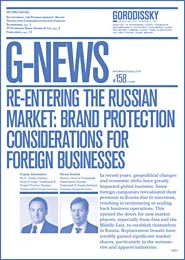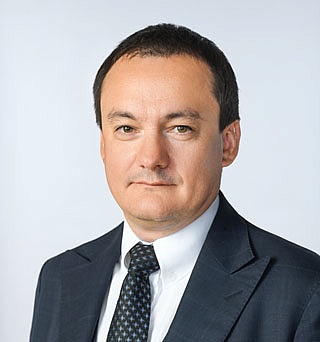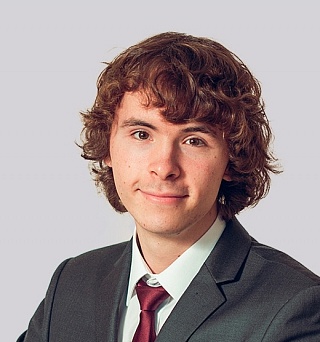Strategies for pharma patent litigation
18 June 2021According to official statistics, the pharmaceutical industry in Russia was among the industries that showed maximum growth in 2020. Production of drugs and materials used for medical purposes grew by 23% compared to 2019. Russia produced drugs worth Rb486 billion (approximately $6.5 billion) in 2020, an increase of 19.9% on 2019.
Over the past few years, a number of significant court cases have affected pharmaceutical patent litigation strategies. This chapter highlights some of the most important issues for patent owners that should be considered when building a patent litigation strategy in Russia.
A complex patent enforcement strategy
Patent infringement disputes require a complex approach and the strategy may vary depending on whether it is a dispute with a competitor or a generic company. For instance, a patent litigation strategy with a competitor company that has already marketed the disputed product may include the following actions in different proceedings:
- Litigation before court – Russian legislation provides a wide range of remedies, therefore patentees may claim to recognise their patent right and prohibit the use of their invention in the disputed product. Remedies include demand for payment of compensation or reimbursement in the form of damages, as well as the use of other remedies such as seizure and destruction of counterfeit products and publication of the court decision.
- Patent invalidation – this type of administrative proceedings is usually used as a counter-measure in a patent infringement case and is held by the Chamber of Patent Disputes. An invalidation action does not automatically suspend consideration of the patent infringement case handled by the court but can be used as a valid argument to support the motion concerned.
- Police action – illegal use of an invention can be the subject of a criminal case. Where a patentee finds a counterfeit drug on the market, it will have the right to file a complaint with the police, which may result in a raid and seizure of those drugs and the forwarding of the case to court for sentencing. A civil action can be also filed within a criminal case for the purpose of claiming damages or monetary compensation.
- Unfair competition action – the actions of the infringing company may constitute an act of unfair competition, which is a subject for consideration by the Federal Anti-monopoly Service (FAS). To initiate a case before the FAS, a patentee should file a complaint and the FAS will initiate an administrative investigation, in the course of which the FAS may issue orders to disclose particular information and documents, including financial and commercially valuable information.
Patent disputes with generic companies can be different. Disputes may start when the product has only been prepared for launch and is not yet on the market and while the original patent is still valid. In a situation of this kind, Russian legislation and recent case law offer the possibility of claiming that the generic company’s actions constitute a threat of infringement and demanding that the court prevent these activities.
In addition, it is an increasingly popular strategy for generic companies to lodge a claim for a compulsory licence, requiring the original patentee to have a good defence strategy.
These issues, as well as questions regarding preliminary injunctions and expert opinions, have been elaborated in recent pharma patent disputes and are therefore worth careful consideration.
Expert opinion
Russian legislation provides that during the consideration of a case, to clarify matters that require special knowledge, the court will appoint an independent expert to conduct an examination. During the course of pharma patent disputes the need for specialist knowledge often arises (eg, patent usage or grounds for granting a compulsory licence) and issues require opinions from experts specialised in pharmaceuticals, chemistry, biology, patenting and economics, among other subjects.
In patent disputes, the initiative to conduct an examination is usually taken by the parties, who propose to the court candidates to act as experts and the questions that the selected experts will have to answer. Although courts should give no preference to any particular type of evidence, they mostly rely on expert opinions when deciding questions that require specialist knowledge. The outcome of an entire patent dispute may depend on expert opinion, so it is therefore extremely important to get the most out of the expert examination and employ all possibilities available through legislation (eg, propose well-qualified expert candidates, challenge the opposition’s experts and draft pertinent questions).
In the event of disagreement with the results of the examination, the parties may apply an additional or repeated expert examination. For instance, in Sotex Pharmaceuticals v Pharmasoft, Ellara (A50-7506/2015) the court agreed with the plaintiff’s conclusions that an additional expert examination was necessary, since there were contradictions and objective flaws in the original expert’s report. As a result, the plaintiff was able to win the dispute and conclude a favourable settlement agreement.
In most pharma patent disputes courts order an examination to determine whether a patent is used in a disputed product. However, there are some rare exceptions. In Pfizer v Pharmasintez (A40-30124/2015), the court dismissed the claims for expert examination and concluded that the patent rights had been infringed. In particular, the court made consistent conclusions that:
- the plaintiff’s and the defendant’s drugs contain the same active drug substance voriconazole;
- voriconazole is protected by the plaintiff’s patent 2114838 (this fact was confirmed by Rospatent and the IP Court in Case SIP-17/2015 concerning an extension of the said patent); and
- the defendant could not register and put into circulation its drug without using the plaintiff’s patent.
It seems reasonable that in this case the absence of an expert examination did not violate the rights of the parties and led to a more rapid resolution of the dispute.
However, in another case, the Moscow Commercial Court initially denied a request for an expert examination and independently resolved the complex chemical-patent issue of the use of the invention. This time, this approach served as a basis for reversing the decision and the IP Court, as a court of cassation, remanded the case for fresh consideration (see Orion Corporation v Nativa (A41-12551/2018)). Therefore, the refusal to order a patent examination should be exceptional and must be justified by the court.
As a defence argument, generic companies often cite that they are using their own patent, so that there is no infringement of the plaintiff’s rights. In this context, it is important that the court correctly assesses the need to conduct an examination not only on the basis of documents, but also to compare patents with actual samples of drugs. For instance, in Bayer HealthCare LLC v Nativa (A41-3828/2018), the IP Court stated that the denial of the claim based on the defendant’s own patent was not legitimate and remanded the case for reconsideration. In addition, the court pointed out that it was necessary to approach the issue of examination comprehensively: first, to establish the fact of use or non-use of the defendant’s own patent in the manufactured drug; and second, if the defendant’s own invention was not used, to establish the use or non-use of the plaintiff’s patent.
Therefore, to successfully resolve a dispute, it is necessary to actively participate in the matter of appointing an expert examination and to challenge its results on objective grounds in the event of disagreement.
Preliminary injunctions
While Russian procedural law recognises preliminary and interim injunctions, in pharma patent cases Russian courts are usually reluctant to grant them. This is because patent disputes are complex and concern technical questions, meaning that the court cannot easily estimate the potential use of the patent in the disputed product to assess the grounds for granting a preliminary injunction without deciding on the issue of infringement.
For instance, the IP Court dismissed an application for interim measures filed by Pfizer in the case against Pharmasintez, Cosmopharm and Medresurs (A40-30124/2015). Pfizer demanded the seizure of the entire amount of the pharmaceutical substance voriconazole held by the defendants, as well as a temporary prohibition on the submission of applications for state contracts and supply contracts, particularly those relating to the supply of medicines containing voriconazole. In addition, the plaintiff requested that all samples (copies) of the Biflurin drug held by the two medical institutions be seized.
Among other reasons to deny the grant of preliminary injunctions, the IP Court stated that “disputes concerning the protection of the patent exclusive right belong to the category of complex patent disputes, which are usually considered for a long time and the result of their consideration is not obvious”. Moreover, the court concluded that the stated preliminary injunctions largely duplicated the claims, therefore their grant would mean the satisfaction of the claims before the consideration of the merits of the case.
In addition, Russian courts usually deny the prohibition of the state supply contracts, based on the conclusion that granting such preliminary injunctions in the terms of a lengthy court proceeding could cause significant losses to the respondent due to the actual prohibition of its main business activities (eg, Sugen LLC v Pharmcomplex LLC, A40-37034/18-51-265).
Despite these trends, there are some successful examples of grants of preliminary injunctions in patent disputes. For instance, prohibition of sale and other actions to introduce disputed goods into civil circulation (eg, Case A74-3207/2012) and the arrest of disputed goods (eg, Case A56-32672/2012 and Case A03-3151/2014). It is hoped that court practice in pharma disputes will follow this approach.
Preparatory actions before patent expiry date may be considered infringement
Despite the fact that for a long time court practice has followed an approach not to recognise preparatory actions for the release of a generic drug on the market before the expiry date of the original patent as a threat of infringement, there have recently been positive developments that allow innovator companies to protect their rights. The first case of this kind was Novartis v Nativa (A41-85807/2016), which was considered by the IP Court as a court of cassation. The court concluded that the following successive actions constitute actions that threaten to infringe an exclusive right:
- developing a medicinal product;
- conducting a bioequivalence study of a medicinal product;
- submitting an application to the Russian Ministry of Health for registration of a medicinal product;
- obtaining a registration certificate for a medicinal product; and
- implementing registration of the maximum selling price for a medicinal product included in the list of vital and most important medicines.
As a result, the court upheld the decisions of the lower courts and prohibited entry of the disputed medicinal product onto the market before the expiry date of the patent on the original drug.
Another important case that was heard by the Supreme Court was Astra Zeneca v Jodas Expoim (A40-106405/2018). The court confirmed the possibility of recognising the activities regarding early filing of a market authorisation and subsequent maximum sale price registration as constituting a threat of infringement prohibited under the law. The court obliged the respondent to submit the registrations concerned for cancellation.
In Bristol-Myers Squibb Holdings Ireland Unlimited Company v Nativa (A41-87845/2017) the IP Court not only obliged the defendant to apply for exclusion from the state register of information on the maximum selling price for the drug Dazatinib-nativ, but also set the penalty for non-compliance with the above court decision at the amount of Rb100,000 for the first week of late performance, Rb200,000 for the second week and Rb300,000 for the third and subsequent weeks until the actual execution of the court ruling.
Compulsory licences in Russia
The pharmaceutical industry has had the chance to be a pioneer in the field of compulsory licences in Russia. Analysis of available practice allows us to formulate some defence strategies in situations concerning compulsory licences in cases of dependent inventions.
Article 1358.1 of the Civil Code states that an invention, the use of which in a product or process is impossible without the use of a prior patent of another invention, should be considered a dependent invention.
In accordance with Article 1362(2) of the code, in some cases a rights holder of a dependent invention may force the owner of the previously granted patent to enter into a licence agreement, the terms of which would be approved by the court.
Although generic companies had already attempted to obtain compulsory licences for dependent inventions in the course of litigation, the first known example of such a licence being issued relates to Sugen LLC, Pharmacia & Upjohn Company LLC v Nativa (A40-166505/2017). Initially, the rights holders of the patent for the substance sunitinib filed a suit against Nativa to stop infringement of their patent rights, to prohibit the use of a drug containing the substance sunitinib and to cancel the state registrations of the marketing authorisation and maximum selling price of the product. However, these claims were dismissed in the proceedings. At the same time, Nativa filed a counterclaim for the recognition of its own invention as dependent and for the issuance of a compulsory licence. Subsequently, these counterclaims have been satisfied by the court.
According to Russian legislation, there are several criteria under which the owner of a dependent patent can be granted a compulsory licence. First, the rights holder of the original patent should deny (or ignore) an offer to enter into a licence agreement on “terms consistent with established practice”. After that the patent owner of the dependent invention may file a lawsuit seeking the grant of a compulsory non-exclusive licence and during the court proceedings prove that his or her invention:
- represents an important technical achievement; and
- has significant economic advantages compared to the original invention.
The court in this case noted that there is no legal definition of a dependent patent in the current Russian legislation and there is no consistent case law on its interpretation. In this light, the approach that was finally taken by the court was rather formal and based largely on the experts’ report.
It should be noted that the case mentioned here has been heavily criticised in the professional community.
Meanwhile, patent owners may consider several recommendations concerning such claims for compulsory licences. If possible, the most effective approach would be to invalidate such a dependent patent in administrative proceedings before the Chamber of Patent Disputes.
Alternatively, if there are no grounds to invalidate a dependent patent, it is advisable to:
- have a wide variety of nominee experts in various specialisations that may be proposed as court experts during proceedings; and
- prepare clear-cut and well-grounded arguments, supported by documentary evidence that may be used by the court to assess the criteria of the “importance of technical achievement” and “significant economic advantages” of the dependent invention.
Comment
Russian case law has recently been updated following an influx of new cases and court approaches. There are positive trends in the field of consideration of preparatory actions before the patent expiry date as an infringement. Despite the possible difficulties in obtaining preliminary injunctions and some contradictory court decisions concerning compulsory licensing, a well-built patent litigation strategy will always make the successful protection of IP rights a real possibility.











